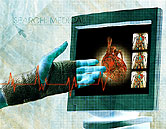 |
 |
 |

Fat Deposits Boost Heart Attack Risk
Globules around organ more dangerous than thick waist or high body mass, study suggests|
|
HealthDay
By Robert Preidt
Thursday, August 7, 2008
 THURSDAY, Aug. 7 (HealthDay News) -- Having excess fat around your heart may be more dangerous than a high body mass index (BMI) or a thick waist in terms of your heart attack risk, according to new research.
THURSDAY, Aug. 7 (HealthDay News) -- Having excess fat around your heart may be more dangerous than a high body mass index (BMI) or a thick waist in terms of your heart attack risk, according to new research.
Wake Forest University Baptist Medical Center researchers and colleagues measured fat deposits around the heart (pericardial fat) in 159 people, ages 55 to 74, and found that those with the highest levels of pericardial fat were 4.65 times more likely to have calcified coronary plaque in the arteries. While calcified coronary plaque itself isn't considered risky, it's associated with the presence of less stable fatty deposits that can lead to heart attack and stroke.
The researchers didn't find an association between volume of pericardial fat and BMI or waist circumference.
Their study is published in the August issue of the journal Obesity.
"Our findings suggest that local fat deposits, rather than total body fat, are most related to calcified coronary plaque. Inflammatory mediators released from pericardial fat may promote inflammation in local coronary arteries and lead to coronary atherosclerosis," study lead author Dr. Jingzhong Ding, an assistant professor of gerontology, said in a Wake Forest news release.
Even thin people can have fat around the heart, noted Ding, adding that he wants to find out whether the buildup of fat around the heart can be prevented.
"Because coronary heart disease kills so many people, it is imperative to find new treatments and prevention strategies," he said.
HealthDay
Copyright (c) 2008 ScoutNews, LLC. All rights reserved.
Related News:
More News on this Date
Related MedlinePlus Pages:
| Home | Health Topics | Drugs & Supplements | Encyclopedia | Dictionary | News | Directories | Other Resources | |
| Disclaimers | Copyright | Privacy | Accessibility | Quality Guidelines U.S. National Library of Medicine, 8600 Rockville Pike, Bethesda, MD 20894 National Institutes of Health | Department of Health & Human Services |
Date last updated: 08 August 2008 |




